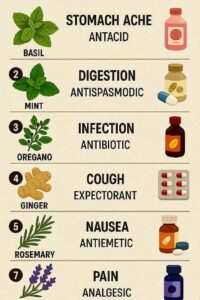
Your Kitchen Herbal Medicine Cabinet: Nature’s Remedies for Common Ailments
In a world increasingly turning towards natural wellness, many powerful remedies can be found not in a pharmacy, but in your own kitchen or garden. The illustrated guide provides a brilliant snapshot of how common herbs can be used to address everyday health concerns, pairing the symptom with the type of remedy and the specific plant that can help.
Let’s break down this natural first-aid kit.
1. For a Stomach Ache (Antacid & Analgesic)
A stomach ache can range from simple indigestion to cramping pain. The guide wisely suggests two types of relief:
· Antacid Action: Herbs like Basil (1), Mint (2), and Oregano (3) can help calm an upset stomach by neutralizing excess stomach acid. A warm tea made from fresh mint or basil is a time-honored way to soothe indigestion and bloating.
· Pain Relief (Analgesic): When the stomach ache involves cramping or pain, Ginger (4) and Rosemary (7) come into play. Ginger is a superstar for its anti-inflammatory and analgesic properties, excellent for settling the stomach and relieving discomfort.
2. For Digestion (Antispasmodic)
Beyond a simple ache, you might need something for overall digestive harmony. Antispasmodic herbs help relax the smooth muscles of the digestive tract, reducing spasms and cramping. While many herbs listed have these properties, Peppermint is one of the most well-known for this purpose, helping to ease symptoms of Irritable Bowel Syndrome (IBS) and general digestive unease.
3. For Infection (Antibiotic)
Before the advent of modern medicine, humans relied on nature’s antibiotics to fight infection. Herbs like Oregano (3) and Rosemary (7) possess powerful antimicrobial and antibacterial properties. Oregano oil, in particular, is studied for its ability to combat various strains of bacteria. Incorporating these herbs into your diet can provide a supportive boost to your immune system.
4. For a Cough (Expectorant)
When you have a chesty cough, the goal is to clear the airways. An expectorant helps loosen and expel mucus from the lungs. While not explicitly numbered for this category, herbs like Oregano (3) and Ginger (4) are excellent natural expectorants. A strong tea made with fresh oregano or ginger can help break up congestion and make coughing more productive.
5. For Nausea (Antiemetic)
The feeling of nausea can be debilitating. An antiemetic is specifically designed to prevent or treat nausea and vomiting. Here, Ginger (4) is the undisputed champion. Numerous studies have confirmed its effectiveness in relieving morning sickness, motion sickness, and nausea following surgery. Chewing on a small piece of candied ginger or sipping ginger tea can provide rapid relief.
How to Use Your Herbal Remedies
· Teas/Infusions: The most common method. Steep fresh or dried herbs in hot water for 5-10 minutes.
· Culinary Use: Regularly incorporating these herbs into your cooking is a great form of daily preventive care.
· Inhalation: For respiratory issues, inhaling the steam from a bowl of hot water with a few drops of oregano or rosemary essential oil can be very effective.
A Word of Caution: Nature’s remedies are powerful. Always identify herbs correctly and consult with a healthcare provider before using them to treat specific conditions, especially if you are pregnant, nursing, on medication, or have a serious health issue.
This clever chart reminds us that sometimes, the best medicine is the one that grows naturally all around us. By understanding the properties of these common herbs, you can build a foundational, natural approach to health and well-being.

One Response